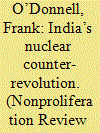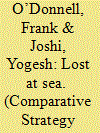| Srl | Item |
| 1 |
ID:
171171


|
|
|
|
|
| Summary/Abstract |
The India–Pakistan near war of February–March 2019 highlights India’s ongoing evolution in strategic thought and practice since its emergence in 1998 as an overt nuclear-weapon possessor. These changes, involving an increasing willingness to engage in the intentional escalation of conflict with a nuclear-armed rival willing to be the first to use nuclear weapons, challenge certain academic assumptions about the behavior of nuclear-weapon states. In particular, they undermine the expectations of the nuclear-revolution theory—which anticipates nuclear and conventional restraint among nuclear-armed rivals through fear of mutual assured destruction—and the model of nuclear learning which underpins this theory, in which new nuclear-weapon states gradually absorb this restraint through policy-maker learning. This article explores how India’s learning pathway since 1998 has deviated from these expectations. India is instead pursuing its own “revolution,” in the direction of creating capabilities for flexible response and escalation dominance. It concludes by illuminating the similarities between Indian strategic behavior and contemporary practices of other nuclear-armed states, and suggests that New Delhi’s emerging de facto nuclear doctrine and posture is part of a broader empirical challenge to our current conceptions of the nuclear revolution and of nuclear learning.
|
|
|
|
|
|
|
|
|
|
|
|
|
|
|
|
| 2 |
ID:
135842


|
|
|
|
|
| Summary/Abstract |
India's first nuclear-armed ballistic missile submarine, the INS Arihant, signifies a milestone in its rise to power. However, its development and supportive strategic discourse reveal the absence of an Indian grand strategy. India urgently needs a grand strategy to direct its defense policy.
|
|
|
|
|
|
|
|
|
|
|
|
|
|
|
|
| 3 |
ID:
143249


|
|
|
|
|
| Summary/Abstract |
India continues to build its material capabilities but there is rising concern about its ability to direct these toward the service of a grand strategy. India's history highlights that a crucial requirement for developing a grand strategy is an integrative, coordinative state. However, historical and current Indian defense reform efforts implicitly admit this absence of an integrative defense policymaking structure. Recognizing the grand strategy lessons from India's own history will assist defense reform initiatives.
|
|
|
|
|
|
|
|
|
|
|
|
|
|
|
|
| 4 |
ID:
152381


|
|
|
|
|
| Summary/Abstract |
India’s nuclear doctrine and posture has traditionally been shaped by minimum deterrence logic. This logic includes assumptions that possession of only a small retaliatory nuclear force generates sufficient deterrent effect against adversaries, and accordingly that development of limited nuclear warfighting concepts and platforms are unnecessary for national security. The recent emergence of Pakistan’s Nasr tactical nuclear missile platform has generated pressures on Indian minimum deterrence. This article analyzes Indian official and strategic elite responses to the Nasr challenge, including policy recommendations and attendant implications. It argues that India should continue to adhere to minimum deterrence, which serves as the most appropriate concept for Indian nuclear policy and best supports broader foreign and security policy objectives. However, the form through which Indian minimum deterrence is delivered must be rethought in light of this new stage of regional nuclear competition.
|
|
|
|
|
|
|
|
|
|
|
|
|
|
|
|